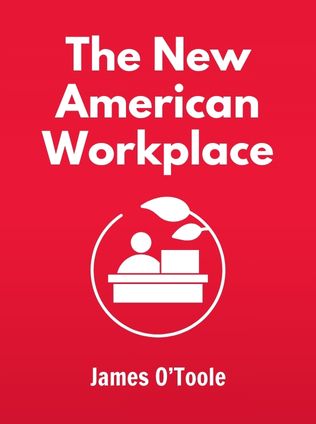
The New American Workplace
By James O’Toole,
Published 08/2007
About the Authors
James O'Toole and Edward E. Lawler III are renowned scholars and experts in management and workplace dynamics. James O'Toole, the principal author of the influential Work in America report, has a rich background in social anthropology, holding a doctorate from Oxford University. His work focuses on leadership, ethics, and corporate governance. Edward E. Lawler III, a distinguished professor at the Marshall School of Business, University of Southern California, is the founder and director of the Center for Effective Organizations. Lawler has authored or co-authored 41 books, focusing on organizational effectiveness, employee involvement, and human resources. Together, they bring a wealth of knowledge and experience to their examination of the American workplace.
Main Idea
The New American Workplace explores the transformative changes in the U.S. labor market over the past few decades, driven by globalization, technological advancements, and evolving corporate strategies. The authors argue that these forces have reshaped the nature of work, leading to increased job insecurity, the rise of contingent employment, and the erosion of traditional career paths. They provide a detailed analysis of how these changes impact workers, organizations, and the broader economy, while also offering practical recommendations for navigating this complex landscape. The book emphasizes the need for a new social contract that balances the interests of employers, employees, and society at large.
Table of Contents
- Introduction: The Changing Landscape of Work
- Work in America: A Historical Perspective
- The Global Economy and the American Workforce
- Emerging Management Models: Low-Cost Operators, Global Competitors, and High-Involvement Companies
- Key Themes in the Modern Workplace
- The Nature of Workplaces Today
- Changes in the American Workplace
- Consequences for the American Worker
- Choices and Future Directions
- The Future of the American Workplace
Analyzing and Explaining Key Ideas
Introduction: The Changing Landscape of Work
The authors begin by outlining the dramatic shifts in the American workplace, driven by globalization and technological innovation. They highlight how these forces have led to increased competition, the rise of knowledge-based industries, and the decline of traditional manufacturing jobs. This section sets the stage for understanding the broader context in which American workers and employers operate today.
Globalization has brought about a new economic order characterized by the free flow of capital, goods, services, and labor across borders. This has led to significant changes in the nature of work and employment, with companies increasingly looking to global markets for growth opportunities. The rise of information technology has further accelerated these changes, enabling more efficient communication, collaboration, and automation of tasks.
"The workplace is now characterized by increased competition, the rise of knowledge-based industries, and a shift towards more flexible and contingent forms of employment." - James O'Toole and Edward E. Lawler III
Work in America: A Historical Perspective
O'Toole and Lawler provide a historical overview of the American workplace, tracing its evolution from the post-World War II era to the present. They highlight the transition from an industrial economy dominated by manufacturing jobs to a service-oriented economy characterized by knowledge-intensive work. This shift has had profound implications for job security, career paths, and the nature of work itself.
In the mid-20th century, American workers enjoyed relatively high levels of job security, with stable, long-term employment being the norm. However, as the economy shifted towards services and technology, the traditional model of employment began to erode. The rise of the gig economy and the increasing prevalence of contingent work arrangements reflect a broader trend towards flexibility and insecurity in the labor market.
The authors argue that this transition has not been without its costs. While some workers have benefited from the new opportunities created by the knowledge economy, others have been left behind. The decline of manufacturing jobs has disproportionately affected certain regions and demographic groups, leading to economic and social dislocation.
The Global Economy and the American Workforce
The book delves into the impact of globalization on the American workforce. The authors discuss how the transnational flow of capital, goods, services, and labor has led to greater national specialization and increased competition across borders. The United States has positioned itself at the top of the global economy by focusing on high-technology, capital- and knowledge-intensive industries. However, this has also led to a process of "creative destruction," where inefficient products, companies, and entire industries are continually replaced by new ones. This dynamic environment requires both workers and organizations to adapt constantly.
Sign up for FREE and get access to 1,400+ books summaries.
You May Also Like
Rich Dad Poor Dad
What the Rich Teach Their Kids About Money - That the Poor and Middle Class Do Not!
By Robert T. KiyosakiFreakonomics
A Rogue Economist Explores the Hidden Side of Everything
By Steven D. Levitt and Stephen J. DubnerThe Lean Startup
How Today's Entrepreneurs Use Continuous Innovation to Create Radically Successful Businesses
By Eric RiesWho Moved My Cheese?
An Amazing Way to Deal with Change in Your Work and in Your Life
By Spencer Johnson, M.D.Factfulness
Ten Reasons We're Wrong About the World – and Why Things Are Better Than You Think
By Hans RoslingMake Your Bed
Little Things That Can Change Your Life...And Maybe the World
By William H. McRaven



















